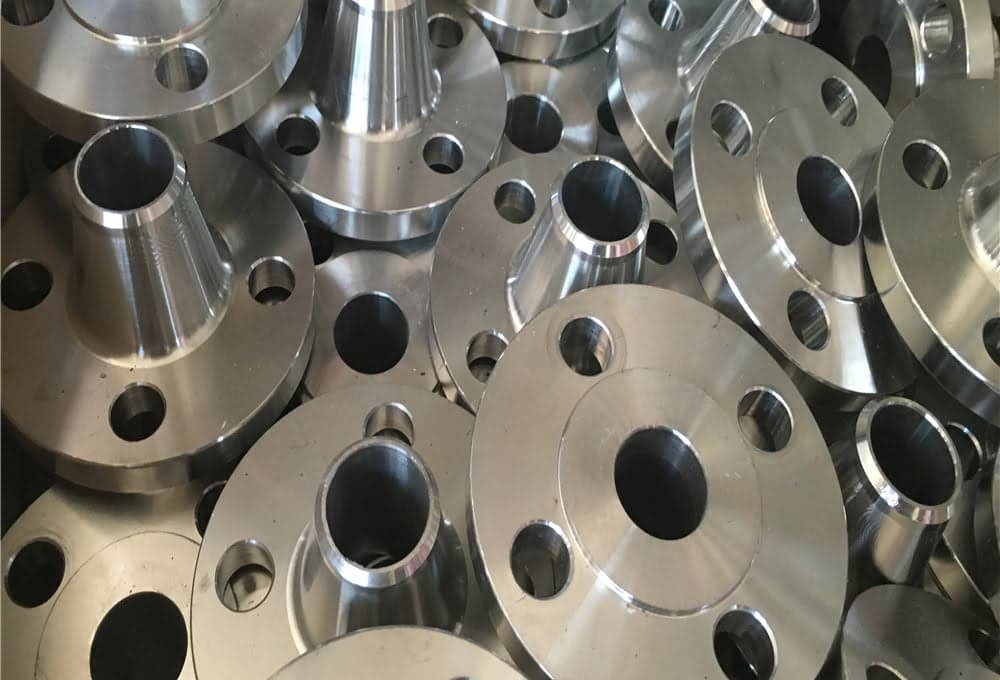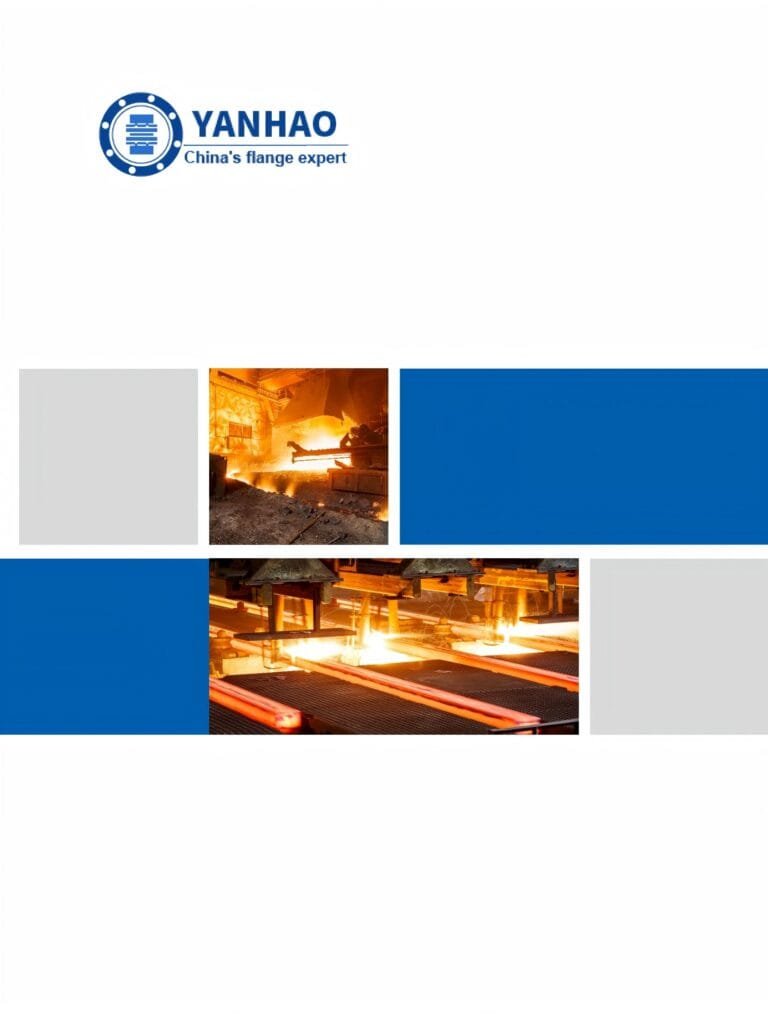What are Carbon Steel Flanges?
Welcome to the YANHAO blog! In this article, we will delve into what are carbon steel flanges and understand their crucial role in piping systems extensively discuss the features and advantages of carbon steel flanges and explain how to select the appropriate flange type and size based on different application requirements.

By reading this article, you will gain a better understanding of the widespread application of carbon steel flanges in industries such as oil and gas, chemical, pharmaceutical, power generation, and paper. Additionally, you will learn about the advantages of choosing YANHAO as a reliable and trusted manufacturer of high-quality flanges.
Understanding Carbon Steel
Carbon steel is a type of steel that primarily consists of carbon and iron, with trace amounts of other elements such as manganese, silicon, and copper. It is one of the most widely used materials in various industries due to its excellent mechanical properties and affordability.
When it comes to carbon steel flanges, the properties of carbon steel make it an ideal choice. Here are some of the advantages of using carbon steel in flanges:
- Strength and Durability: Carbon steel has a high tensile strength, which makes it capable of withstanding high-pressure and high-temperature environments. This makes it suitable for use in demanding applications.
- Corrosion Resistance: Carbon steel can be made corrosion-resistant through the addition of specific alloys or through surface treatments like galvanizing or painting. This ensures that the flanges are protected from rust and other forms of corrosion.
- Cost-Effective: Carbon steel is relatively inexpensive compared to other materials like stainless steel or alloy steel. This affordability makes it a popular choice for flanges in many industries.
As a leading China flange manufacturer, YANHAO is highly experienced in producing quality flange products that meet industry standards. We have a comprehensive understanding of carbon steel and its properties, allowing us to provide flanges that are reliable and durable. Our state-of-the-art manufacturing processes and quality control measures ensure that our carbon steel flanges meet the highest standards of performance and customer satisfaction.
By choosing YANHAO as your supplier, you can benefit from our expertise and reputation in the industry, as well as our commitment to delivering products that meet your specific requirements.

Different Types of Carbon Steel Flanges
There are several different types of carbon steel flanges available in the market, each designed to suit different piping requirements and applications. Here are some of the commonly used types of carbon steel flanges:
- Weld Neck Flanges: These flanges have long tapered hubs and are widely used for high-pressure applications. The welding neck design provides a strong and leak-proof connection between the pipe and flange.
- Slip-On Flanges: Slip-on flanges are easy to install and are ideal for low-pressure applications. They slide over the pipe and are then welded in place.
- Socket Weld Flanges: Socket weld flanges have a socket or bore for the pipe to fit into, making them suitable for small pipelines and high-pressure applications.
- Blind Flanges: Blind flanges are solid discs used to close off the end of a pipe. They are commonly used when future expansion of the piping system is anticipated.
- Threaded Flanges: Threaded flanges have internal threads that allow them to be connected to pipes with external threads. They are commonly used for low-pressure applications.
- Lap Joint Flanges: Lap joint flanges consist of two parts – the stub end and the backing flange. They are used in systems requiring frequent dismantling.
Each type of flange has specific features and advantages based on the requirements of the application. It is important to select the appropriate type of carbon steel flange based on factors such as pressure rating, temperature, size, and compatibility with the piping system.
As a leading manufacturer of carbon steel flanges, YANHAO offers a wide range of flange types and sizes to meet the specific needs of our customers. We ensure that our flanges meet industry standards and provide reliable performance for various applications.

Importance of Carbon Steel Flange Industry Standards
The carbon steel flange industry operates based on established standards to ensure proper compatibility, functionality, and safety of flanges in various applications. Some of the key industry standards for carbon steel flanges include ASME (American Society of Mechanical Engineers), ANSI (American National Standards Institute), and ASTM (American Society for Testing and Materials).
ASME standards, specifically ASME B16.5 and ASME B16.47, lay out the dimensions, materials, and pressure-temperature ratings of flanges. These standards ensure uniformity and compatibility between different flange manufacturers and allow for easy interchangeability in projects.
ANSI standards, such as ANSI B16.5 and ANSI B16.47, provide guidelines for flange dimensions, tolerances, facing types, and marking requirements. These standards further contribute to the interoperability and reliability of carbon steel flanges across the industry.
ASTM standards focus on the quality and performance of the materials used in flange production. For carbon steel flanges, ASTM A105 is a widely recognized standard that specifies the chemical composition, mechanical properties, and heat treatment requirements for carbon steel used in flanges.
Adherence to industry standards is crucial for manufacturers and suppliers like YANHAO. We understand the significance of these standards in ensuring the quality and reliability of carbon steel flanges. As a reputable manufacturer, we strictly adhere to ASME, ANSI, and ASTM standards in our manufacturing processes.
Moreover, YANHAO holds various certifications, such as ISO 9001, which demonstrate our commitment to quality management systems. These certifications validate our adherence to industry standards and assure customers of our dedication to delivering reliable and compliant carbon steel flanges.
Choosing a manufacturer like YANHAO, which prioritizes industry standards and certifications, ensures that you receive flanges of the highest quality and performance, meeting the necessary requirements of your piping systems.

Navigating Carbon Steel Flange Sizing
Determining the correct size of carbon steel flanges is essential for optimal performance and functionality of the piping system. Here are some key considerations and factors involved in sizing carbon steel flanges:
- Pipe Size and Schedule: The size of the flange should match the size and schedule of the pipe to ensure a proper fit and connection. Flanges are available in various sizes ranging from 1/2″ to over 100″ to accommodate different pipe sizes.
- Pressure Rating: Flanges are designed to handle specific pressure ratings based on the application. It is crucial to select a flange with a pressure rating that matches or exceeds the pressure requirements of the system.
- Flange Facing: Flanges may have different facing types such as raised face (RF) or ring type joint (RTJ). The facing type should be chosen based on the requirements of the piping system and the type of gasket being used.
- Flange Dimensions: Flanges have specific dimensions such as outer diameter (OD), bolt hole diameter, and thickness. These dimensions should be matched with the corresponding pipe dimensions to ensure proper alignment and connection.
Accurate flange sizing is vital to avoid issues such as leakage, improper sealing, or flange deformation, which can lead to system failures or safety hazards. Proper flange sizing ensures a reliable and leak-free connection between the pipe sections, promoting efficient fluid flow and system performance.
YANHAO, as a leading manufacturer of carbon steel flanges, understands the importance of accurate flange sizing. We have a team of experts who can provide customized flange solutions to meet specific size requirements. Whether it’s a standard size or a unique size requirement, we have the capabilities to design and produce flanges that precisely match your piping system needs.
With our extensive experience and expertise, we can guide you in selecting the appropriate size and specifications for carbon steel flanges, ensuring optimal performance and compatibility within your piping system.
Application of Carbon Steel Flanges
Carbon steel flanges find extensive applications across various industries due to their durability, strength, and versatility. Some of the industries that heavily rely on carbon steel flanges include:
- Oil and Gas: Carbon steel flanges are widely used in oil and gas exploration, production, and refining processes. They provide a reliable connection between various components such as pipes, valves, and equipment, ensuring safe and efficient transportation of oil and gas.
- Chemical: The chemical industry utilizes carbon steel flanges for the handling and processing of chemicals. These flanges are resistant to corrosive substances and high-temperature environments, making them suitable for chemical plants and pipelines.
- Pharmaceutical: Carbon steel flanges play a crucial role in pharmaceutical manufacturing processes. They are used in pipelines and equipment for the transfer of pharmaceutical ingredients, ensuring hygienic and contaminant-free production.
- Power Generation: Power plants, including thermal power plants and nuclear power plants, rely on carbon steel flanges for their steam and coolant systems. These flanges provide a secure connection, maintaining the integrity of the pipelines and facilitating efficient energy generation.
- Paper: The paper industry requires carbon steel flanges in its pulp and paper processing operations. Flanges are used in pipelines for the transportation of materials such as water, chemicals, and pulp, ensuring smooth and reliable production processes.
YANHAO has successfully partnered with clients across these industries, providing customized carbon steel flange solutions tailored to their specific requirements. While specific testimonials or case studies may not be available, our expertise, reliability, and commitment to delivering high-quality flanges have resulted in longstanding partnerships with clients who trust us for their carbon steel flange needs.
Through collaboration with clients in the oil and gas, chemical, pharmaceutical, power generation, and paper industries, YANHAO has demonstrated its capability to meet the rigorous demands of these sectors and provide reliable flange solutions that contribute to their operational success.
Conclusion
In conclusion, carbon steel flanges play a vital role in ensuring reliable and efficient piping systems across various industries. These flanges provide secure connections, withstand high pressures and temperatures, and resist corrosion, making them essential components for maintaining system integrity.
To meet your carbon steel flange needs, we invite you to explore YANHAO’s comprehensive range of products. Our expertise and commitment to delivering high-quality flanges have earned us a reputation as a trusted manufacturer in the industry. Whether you require standard sizes or customized solutions, we have the capabilities to meet your specific requirements.
At YANHAO, we prioritize customer satisfaction and aim to exceed your expectations. Our team is dedicated to delivering exceptional customer service, providing technical guidance, and ensuring a seamless experience throughout the process. Trust us to deliver the carbon steel flanges you need to achieve optimal system performance.
Contact YANHAO today and discover how our carbon steel flanges can enhance the reliability and efficiency of your piping systems.
Author: Lewis Liu
Hello, my name is Lewis Liu, and I’m a professional sales engineer with over a decade of expertise in the flange fittings sector.
I am quite informed about flange selection, installation, and maintenance. I am passionate about providing customers with the greatest solutions for keeping their pipeline systems running smoothly, safely, and dependably.
If you have any queries or concerns concerning flange fittings for your pipelines, whether they are about selection, material choice, specification requirements, or anything else, please contact me at any time. I am dedicated to providing expert advice and assistance to help you make educated decisions and reach your objectives.

